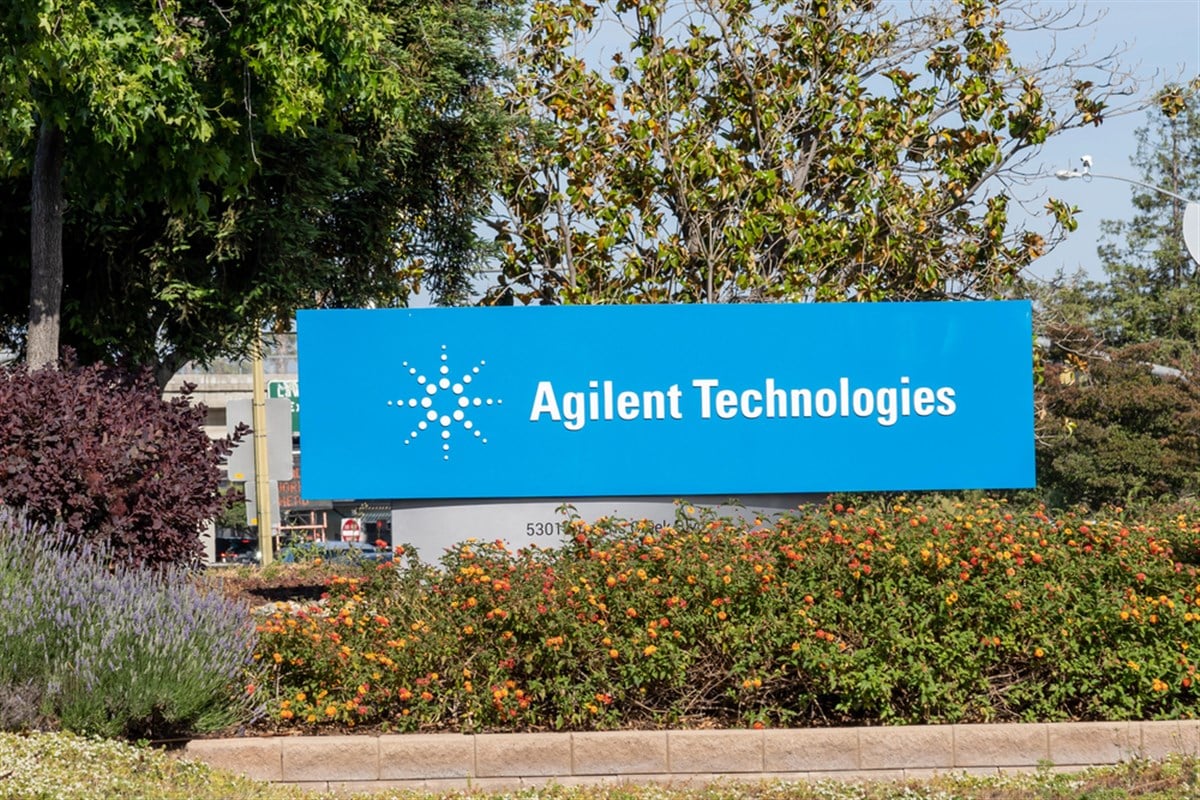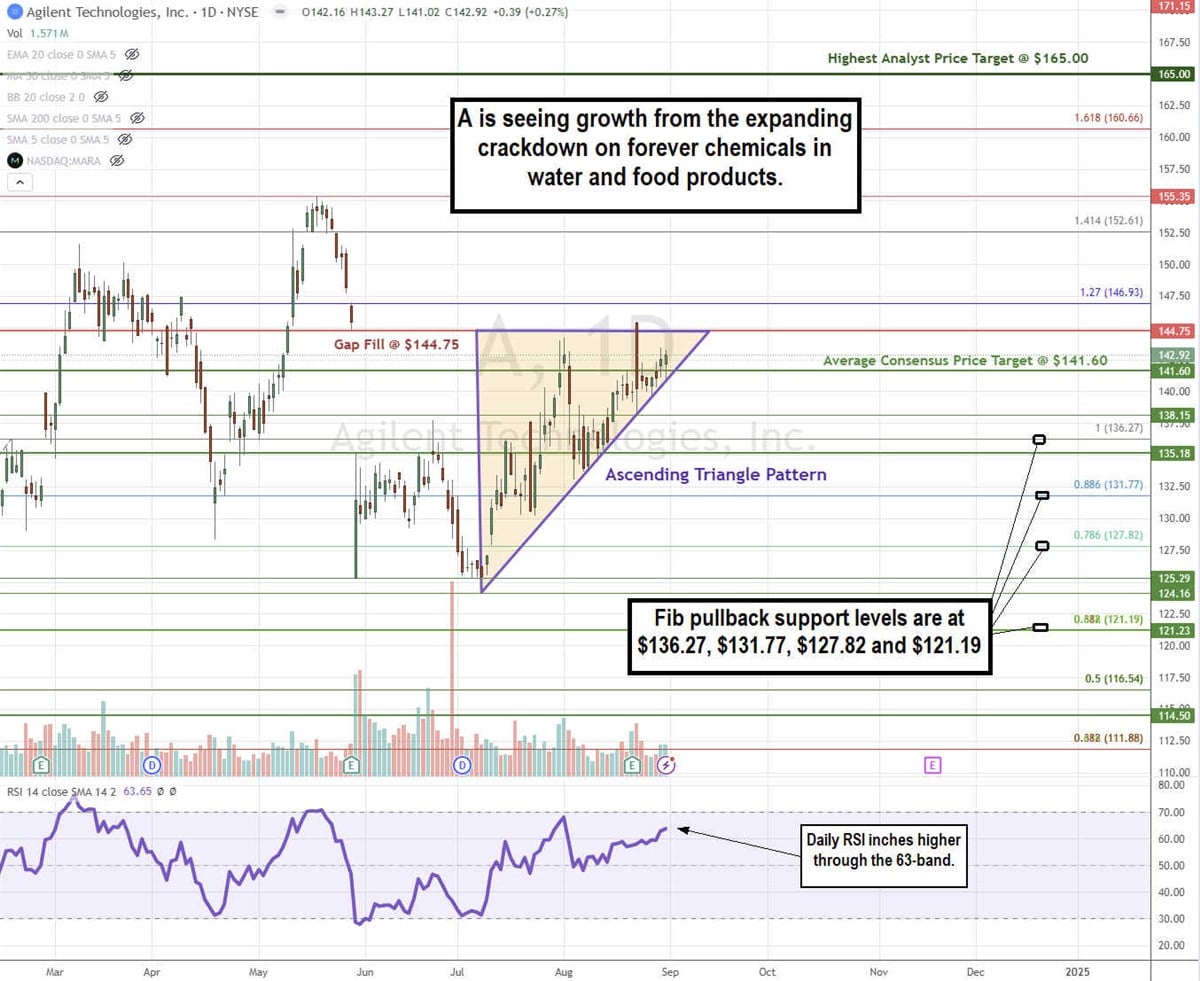
Agilent Technologies Inc. (NYSE: A) is a diversified global leader in the life sciences, diagnostics, and applied chemical markets. The company provides equipment systems, instruments, software and services that enable researchers and scientists to make breakthroughs in the medical sector and various fields. While its many segments are experiencing pullbacks in the end market, its top growth segment is being driven by solutions to address polyfluoroalkyl substances (PFAS), otherwise known as forever chemicals.
PFAS are called forever chemicals due to their extremely slow process of breaking down, if at all. They can accumulate in the human body and lead to health problems ranging from cholesterol, obesity, and cancer to developmental and reproductive issues. Agilent, through its Environmental and Forensics business, provides equipment and testing tools that help extract and screen for PFAS in water.
Agilent Technologies competes with scientific instruments leader Thermo Fisher Scientific Inc. (NYSE: TMO), Danaher Co. (NYSE: DHR), and chromatography leader Waters Co. (NYSE: WAT).
Growing Awareness and Scrutiny Over Forever Chemicals
PFAS are man-made chemicals that have been used in consumer and industrial products since the 1940s. They are well known for their heat, stain, oil, and water-resistant properties. However, they have been gaining increased scrutiny for environmental and health risks.
PFAS is found in everyday products like water-proof clothing, non-stick pans, batteries, stain-resistant carpets, fast food containers, grease-resistant paper, candy wrappers, shampoo, nail polish, and even bottled water. A study found that 39 out of 101 bottled water products contained more PFAS than purified ones. PFAS was also found in 9 out of 11 plastic food storage bags.
Government Legislation Is Just Starting
The Biden-Harris Administration has been active in combating PFAS pollution. On April 10, 2024, they finalized the first-ever national drinking water standard, which aims to protect 100 million people from PFAS pollution. The Environmental Protection Agency (EPA) provided $1 billion in funding to implement PFAS testing and treatment in the nation’s public water systems.
This falls right into Agilent's wheelhouse. The company saw its Environmental and Forensics business revenue grow 4% YoY, driven by a rise in PFAS testing workflows in Europe and China. Potential Federal Drug Administration (FDA) regulations pertaining to PFAS-free product requirements would be a major catalyst for Agilent. While Agilent provides testing mainly for water, its addressable market would continue to expand into the food industry.
Agilent's Segments Are Slowing
Agilent reported fiscal Q3 2024 EPS of $1.32, beating consensus estimates by 6 cents. GAAP net income surged 155% YoY to $282 million. Non-GAAP net income fell 8% YoY to $385 million. Revenues slumped 5.6% YoY to $1.58 billion, still beating consensus estimates of $1.56 billion.
Life Sciences and Applied Markets Group (LSAG) had an 8% revenue decline to $782 million and an operating margin of 28.4%. The Agilent CrossLab Group (CG) saw a 4% spike to $411 million and a 34% operating margin. The Diagnostic and Genomics Group (DGG) saw a 9% revenue drop to $385 million and an operating margin of 18.3%.
Agilent Technologies CEO Padrig McDonnell commented, “While market conditions continued to be challenged during the quarter, we saw steady signs of improvement as anticipated. We continue to make investments in our most promising growth opportunities. And we are mobilizing the organization to accelerate value creation through strategic transformation initiatives, which will drive margin expansion and growth—and increase our execution capabilities.”
Agilent Stock Is in an Ascending Triangle Pattern, Trying to Fill the Gap
An ascending triangle is comprised of a flat-top upper trendline, which is the resistance. The ascending trendline formed at $124.16, connecting the higher lows to meet at the apex point.

The gap formed on its previous earning report when shares fell from $144.75 to $135.18 was filled on its Q3 2024 earnings spike through $144.75, which pulled back to the ascending trendline where it bounced. Shares are slowly rising towards the flat-top upper trendline. The relative strength index (RSI) continues to rise slowly through the 63-band. Fibonacci (fib) pullback support levels are at $136.37, $131.77, $127.82 and $121.19.
Agilent Technologies stock has an average consensus price target of $141.60, and its highest analyst price target is $165.00.
Bullish investors can consider using cash-secured puts to take positions on pullbacks at the fib support levels. A wheel strategy can be implemented to generate income upon being assigned shares and writing covered calls while collecting the 0.66% annual dividend yield.




